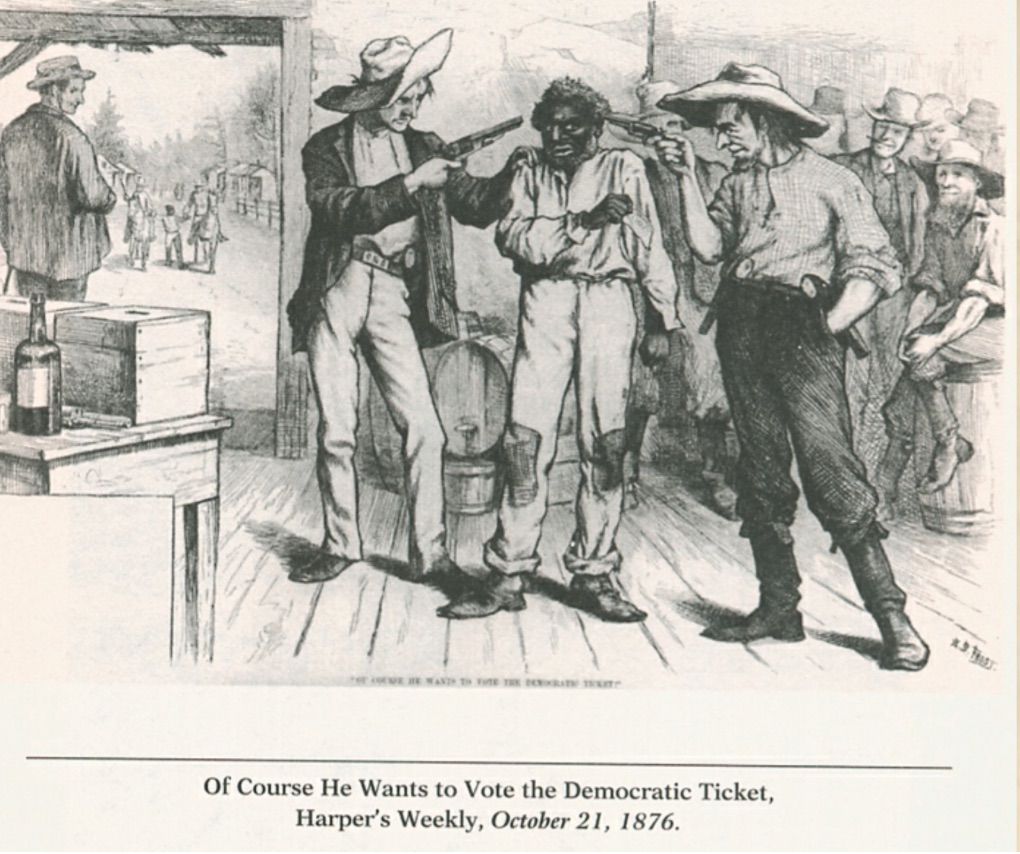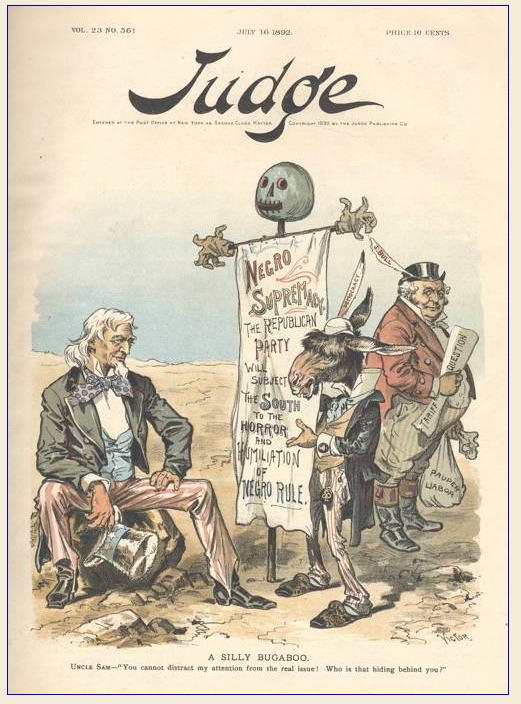
Disenfranchisement by the numbers
This happens in two stages: in the first, at the end of Reconstruction, the Republican vote in Virginia drops from 40% in 1876 to 4.1% in the 1877 elections; in Mississippi, from 30% to 1.2%.

But between 1877 and 1890, despite overwhelming hostility, the standard of living for Southern freedmen and women rose steadily. In that period, according to historian Leon Litwack, total acreage owned by African Americans tripled; school enrollment and literacy increased by over 40%.
The second takes place in the last decade of the 19th century. In 1888, in the black-majority states of La., Miss, SC, Republican candidate Benjamin Harrison gets less than 30% of the vote; in 60%-black SC, he gets 17.2%. In response, Republicans propose the Lodge Federal Elections Bill in 1890, which allows 100 concerned citizens in any district to call for federal monitoring of suspect congressional elections and even arbitration of victory in disputed cases. Massachusetts Senator Henry Cabot Lodge argues that the bill mandates merely that "the people should be informed and should know all the facts....It interferes with no man's rights; it changes no local system....There must be something very interesting in the methods by which these guardians of virtue hope to gain and hold political power when they are so agitated at the mere thought of having the darkness which now overhangs the places where they win their victories dispersed."
Southern Democrats nonetheless call it a “force bill.” (Recall some of the rhetoric in the Democratic party's platforms, which complains about various "undemocratic" ways that they're being forced to let black people vote, as well as the 1830s Force Bill. This reference to "tyranny" will also come up in the 1948 Dixiecrat platform and in "Massive Resistance" to Brown v. Board of Ed. in the 50s.) It passes the House 155-149 but is delayed in the Senate, where Democrats put off voting on a tariff bill indefinitely to keep Republicans from pursuing the Lodge Bill. (The idea is to put pressure on Republicans who want the tariff bill to be brought to the floor for a vote to give up on racial justice.)

In this 1892 cover image from the magazine Judge, the Democrats attempt to distract Uncle Sam from the real problem, their low tariff (which will let England dominate the American market), with the scarecrow of "Negro supremacy."
The Republicans are then smashed in the 1890 elections, ending up down 235-88 in House (+9 Populists).
The bill finally goes down to defeat after the election, when Senate Democrats filibuster it to death (the first bill to be so defeated) and Western pro-silver House Republicans work with the Democrats, who agree to support consideration of free silver in exchange for their support. It marks the last significant civil-rights legislation until mid-20th c.
This induces the white South to then legally suppress the black vote through poll taxes, literacy tests, and grandfather clauses. In 1894 Democrats push through repeal of 40 sections of the KKK Act of 1871, which Democratic President Grover Cleveland signs on the 85th anniversary of Lincoln’s birth. One former Republican Senator: repeal will “leave the Southern aristocracy again the masters of the country, as they were before their rebellion, until the people of the US again wake up."
By 1895, black voting in the South had decreased 65%, white voting by 26%. In 1896, Deep South turnout is 34.9%, as compared with 79.3% nationally. McKinley’s first inaugural (Mar. 1897) nevertheless declares that “free and fair elections…are more universally enjoyed to-day than ever before,” adding that “the North and the South no longer divide on the old lines.” After white violence kills 14 in Wilmington, NC in 1898, McKinley endorses Washingtonesque pursuit of goals for African-Americans: “nothing in the world commands more respect than skill and industry.” (See pleas to the president for help from black North Carolinians, 1898-1900.) By 1900, voting by African Americans had almost completely stopped. Republicans back off from support for civil rights. Their 1900 platform states merely that voting-rights restrictions in the South “should be condemned.”